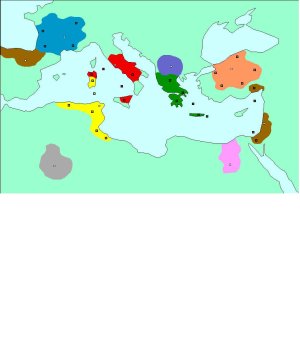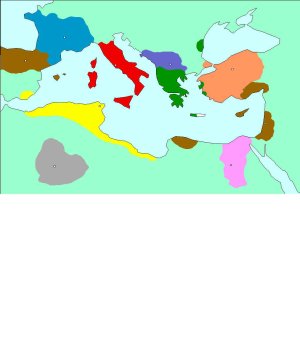The Troquelet
Conscious
- Joined
- Apr 15, 2002
- Messages
- 1,950
AP Press
May 21, 300 BC
Late breaking news this week: six new rulers have come to power in city-states across the Mediterranean, claiming power in a move designed to expand their empires beyond the city walls, perhaps stretching thousands of miles in each direction. To this end they spent much of their treasury on training new military units.
When we questioned self-proclaimed King Mithridates on his recent refurbishments of the armed forces, he refused to elaborate. Likewise, the new monarchs worldwide joined in a resounding "No Comment", claiming the need for national security as the cause of their secretiveness. While each military minister claimed that his troops were for internal use only, several expressed alarm at the skyrocketing armies in other nations, fearing a possible assault... ?
Nevertheless, the world continued in peace up to this Tuesday. By bribing some chief officials, we were able to discover that no army reached a greater size than seven "units". However, the Associated Press would like to mention the possibility that this estimate is off slightly, or even totally inaccurate. By like means, we were able to discover that the largest treasury numbers 10 gold talents.
The world leaders will meet with Reuters on Friday to unveil their latest expansion plans.
OOC (Yes, even I get a character, the press!): Hi everyone. As you can see, I have received monetary orders and am ready to process moves by Friday, or even before if you all send them before Thursday. Here's your status ("go" means you don't need to send me anything):
Toasty: You're go for Friday.
Sullla: You're go for Friday.
UKnemesis: You're go for Friday.
Erik Mesoy: Please send me a PM with your moves, your luxury bid, and your science bid. In case you don't remember, I'll send you a PM showing you which FBs carry which units, and how many talents you have.
Wilboman: Please send me a PM with your moves, your luxury bid, and your science bid. In case you don't remember, I'll send you a PM showing you which FBs carry which units, and how many talents you have.
Demetrias: Please send me a PM with which units are being attached to which FBs, your moves, your luxury bid, and your science bid. In case you don't remember, I'll send you a PM showing you which FBs carry which units, and how many talents you have.
When I receive all orders from Erik, Wilboman, and Demetrias, I'll post a new map and press update. And then we can finally move to the new easier system.
May 21, 300 BC
Late breaking news this week: six new rulers have come to power in city-states across the Mediterranean, claiming power in a move designed to expand their empires beyond the city walls, perhaps stretching thousands of miles in each direction. To this end they spent much of their treasury on training new military units.
When we questioned self-proclaimed King Mithridates on his recent refurbishments of the armed forces, he refused to elaborate. Likewise, the new monarchs worldwide joined in a resounding "No Comment", claiming the need for national security as the cause of their secretiveness. While each military minister claimed that his troops were for internal use only, several expressed alarm at the skyrocketing armies in other nations, fearing a possible assault... ?
Nevertheless, the world continued in peace up to this Tuesday. By bribing some chief officials, we were able to discover that no army reached a greater size than seven "units". However, the Associated Press would like to mention the possibility that this estimate is off slightly, or even totally inaccurate. By like means, we were able to discover that the largest treasury numbers 10 gold talents.
The world leaders will meet with Reuters on Friday to unveil their latest expansion plans.
OOC (Yes, even I get a character, the press!): Hi everyone. As you can see, I have received monetary orders and am ready to process moves by Friday, or even before if you all send them before Thursday. Here's your status ("go" means you don't need to send me anything):
Toasty: You're go for Friday.
Sullla: You're go for Friday.
UKnemesis: You're go for Friday.
Erik Mesoy: Please send me a PM with your moves, your luxury bid, and your science bid. In case you don't remember, I'll send you a PM showing you which FBs carry which units, and how many talents you have.
Wilboman: Please send me a PM with your moves, your luxury bid, and your science bid. In case you don't remember, I'll send you a PM showing you which FBs carry which units, and how many talents you have.
Demetrias: Please send me a PM with which units are being attached to which FBs, your moves, your luxury bid, and your science bid. In case you don't remember, I'll send you a PM showing you which FBs carry which units, and how many talents you have.
When I receive all orders from Erik, Wilboman, and Demetrias, I'll post a new map and press update. And then we can finally move to the new easier system.


 Thanx again Sullla.
Thanx again Sullla. .)
.) but when I come back I'll give you all the news, before 4:00 when I have a cello lesson.
but when I come back I'll give you all the news, before 4:00 when I have a cello lesson.